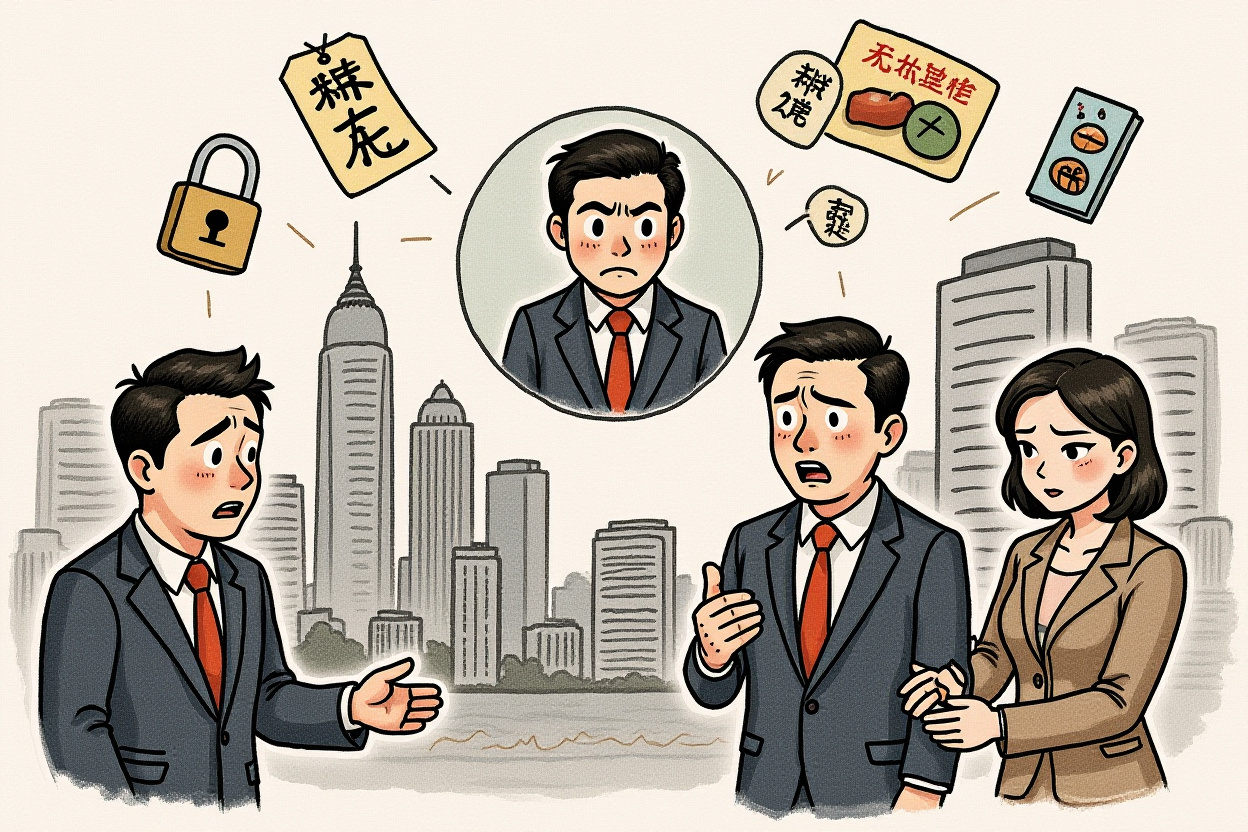Executive Summary
Key takeaways from Xi Bei’s ongoing crisis:
– Founder Jia Guolong’s 贾国龙 series of PR missteps transformed a customer complaint into full-blown brand crisis
– Food safety issues including expired ingredients and unauthorized genetically modified oils damaged consumer trust
– The company’s ‘information bubble’ prevented accurate assessment of market sentiment and appropriate response
– Leadership isolation from ground reality illustrates dangers of executive insulation in Chinese corporate governance
– The crisis highlights growing consumer power in China’s dining sector and zero tolerance for quality issues
The Unraveling of a Restaurant Empire
China’s restaurant industry watched in astonishment as Xi Bei 西贝, one of the country’s most prominent dining chains, descended into its worst crisis in three decades of operation. What began as a customer complaint from celebrity entrepreneur Luo Yonghao 罗永浩 escalated into a full-blown corporate reputation disaster, revealing fundamental flaws in leadership decision-making and quality control systems.
The crisis exposes how even successful Chinese companies can rapidly unravel when leadership operates within an information bubble, disconnected from market realities and consumer expectations. For international investors monitoring Chinese consumer brands, the episode offers crucial insights into governance risks and brand vulnerability in China’s competitive dining sector.
The Four Catastrophic Missteps
Jia Guolong’s 贾国龙 response to initial criticism represents a case study in how not to handle corporate reputation management. Rather than containing the situation, his actions amplified the crisis through four sequential errors.
Denial of Consumer Reality
When customers first complained about premium pricing for what appeared to be pre-made dishes, Jia insisted “Xi Bei isn’t expensive” despite clear market perception to the contrary. This response demonstrated remarkable disconnection from the average consumer’s experience, reminiscent of the infamous “let them eat cake” mentality that often precedes corporate downfalls.
The leadership’s failure to acknowledge pricing concerns created immediate brand distance from its customer base. In China’s increasingly competitive restaurant sector, where consumers have endless alternatives, dismissing price sensitivity represents a critical strategic error.
Privacy Violation Escalation
In a bizarre countermove, Jia released detailed consumption records of Luo Yonghao’s 罗永浩 visit under the label “Luo Yonghao set meal,” exposing specific order details and consumption patterns. This move backfired spectacularly by raising concerns about customer privacy and data protection practices.
Consumers nationwide expressed discomfort about how extensively the restaurant tracked customer behavior. The incident triggered broader concerns about data collection practices in China’s hospitality industry, potentially affecting investor confidence in restaurant technology platforms.
Food Safety Failures Exposed
The crisis took a more serious turn when investigations revealed actual food safety issues that contradicted Xi Bei’s marketing claims of “organic natural” and “100% non-pre-made dishes.”
The Pre-made Dish Revelation
Xi Bei’s apology letter inadvertently confirmed that numerous popular dishes including beef sauce, beef patties, cod strips, lamb skewers, and peppercorn chicken were actually industrial semi-products reheated in stores. This directly contradicted years of marketing positioning around fresh preparation and premium ingredients.
More damning were直播 (live broadcast) revelations showing extended shelf-life products: 24-month shelf life broccoli, 24-month shelf life lamb chops, 18-month shelf life fish, and 12-month shelf life chicken soup. For a brand built on freshness claims, these discoveries proved devastating to consumer trust.
Genetically Modified Oil Controversy
Perhaps most damaging was the discovery that Xi Bei used genetically modified oils while marketing itself as “organic natural.” This contradiction between branding and reality represented a fundamental breach of consumer trust that triggered outrage among health-conscious patrons.
The situation worsened when reports emerged that Xi Bei’s嫩烤DHA大黄鱼 (tender roasted DHA yellow croaker) supplier had provided fish containing banned antibiotic ofloxacin to Walmart stores in Henan in 2020. Ofloxacin is prohibited in food animals because it can affect children’s development, raising serious questions about Xi Bei’s supply chain management.
The Information Bubble Phenomenon
Jia Guolong’s 贾国龙 series of poor decisions reflects a broader pattern of executives operating within information bubbles—environments where they primarily receive filtered information that confirms existing beliefs rather than challenging them.
Leadership Isolation Mechanisms
Multiple factors created Jia’s isolation from market reality. Years of business success built what industry observers describe as “mysterious self-confidence” that made him increasingly resistant to contrary opinions. This pattern常见于 (commonly seen in) founders who achieve rapid success without experiencing significant setbacks.
The problem was compounded by advisors who prioritized agreement over honest feedback. Hua Shan 华杉 of Huayuhua Consulting华与华咨询公司, described his initial meeting with Jia: “If you’re a positioning theory believer, we cooperate; if not, we don’t.” When Hua responded “I’m not,” Jia insisted “You say you’re not, but actually you are! Let’s cooperate!”
Yes-Man Culture Consequences
Hua Shan’s subsequent comment—”Chairman Jia’s logic is so touching, for the sake of the money I won’t argue with you”—reveals the dynamics around successful founders: financial incentives often discourage honest criticism. This creates environments where teams have “extremely poor error-correction capability but strong wave-adding ability”—they amplify rather than challenge leadership decisions.
During the crisis, Hua Shan publicly supported Jia’s approach, tweeting on September 12 that “This isn’t crisis PR because there’s no crisis” and praising Jia for “charging forward without compromising principles.” This reinforcement likely influenced Jia’s subsequent description of Luo Yonghao as “internet black mouth” and “internet black society.”
Failed Huawei Emulation Attempt
Jia frequently cited Huawei as his management model, positioning Xi Bei as “the Huawei of the restaurant industry” and regularly quoting Ren Zhengfei 任正非 in interviews. However, his understanding of Huawei’s success factors appears superficial at best.
Misunderstanding Huawei’s Resilience
During Huawei’s most challenging period with US sanctions in 2020, Ren Zhengfei maintained: “We must persist in learning from America. Its century of accumulation, flexible mechanisms, and strengths in science and technology still surpass ours. We can’t stop seeing America as our teacher just because it suppresses us.” This learning orientation contrasts sharply with Jia’s defensive posture.
Throughout the trade war crisis, Huawei never engaged in emotional public counterattacks or accusations against critics, focusing instead on fulfilling customer commitments. This discipline and focus—not aggressive rhetoric—formed the foundation of Huawei’s respected market position.
Selective Principle Adoption
Jia embraced Huawei’s intense work culture—infamously declaring “996 is nothing” and promoting “715, white plus black, night always meeting” work schedules—without adopting the customer-centric humility that actually drives Huawei’s success. This selective adoption of management practices without understanding their underlying principles represents a common failure pattern among Chinese companies attempting to emulate successful predecessors.
Broader Market Implications
Xi Bei’s crisis extends beyond a single company’s troubles, offering important lessons for investors and operators in China’s consumer sector.
Changing Consumer Power Dynamics
The incident demonstrates dramatically increased consumer influence in China’s marketplace. Social media enables individual complaints to rapidly escalate into national crises, forcing companies to maintain higher standards of transparency and accountability. Brands can no longer rely on marketing claims unsupported by operational reality.
Investors must now assess Chinese consumer companies through additional lenses: social media vulnerability, quality control robustness, and leadership’s connection to ground reality. Companies with insulated leadership operating in information bubbles represent higher investment risks.
Pre-made Industry Impact
The controversy has broader implications for China’s pre-made food industry, which has experienced rapid growth but now faces increased scrutiny. Consumers are increasingly demanding transparency about food preparation methods, potentially forcing industry-wide changes in labeling and marketing practices.
Companies that successfully navigate this new environment will likely gain significant competitive advantages, while those resisting transparency may face similar crises. The China Cuisine Association中国烹饪协会 has already begun discussing industry standards for pre-made dish disclosure in response to growing consumer concerns.
Path Forward for Crisis Management
For Xi Bei and similar companies facing reputation challenges, several recovery principles emerge from this case study.
Leadership Accountability and Change
Sustainable recovery requires leadership acknowledgment of errors and demonstrated behavior change. This may involve bringing in independent advisors willing to provide unfiltered feedback, restructuring decision-making processes to incorporate diverse perspectives, and implementing systematic customer feedback mechanisms that bypass organizational filters.
Companies should consider establishing consumer advisory panels with direct access to leadership, regular anonymous employee surveys, and mandatory store-level immersion for executives—all designed to puncture information bubbles before they cause strategic failures.
Operational Transparency Commitment
Beyond crisis response, companies must build transparency into ongoing operations. This includes supply chain visibility, ingredient sourcing disclosure, and preparation method transparency. Technologies like blockchain for supply chain tracking and live kitchen streams can provide verifiable claims support.
The most successful restaurant brands will likely embrace radical transparency as competitive advantage rather than compliance requirement. Early adopters of comprehensive transparency practices may capture market share from traditional operators as consumers increasingly prioritize trustworthiness in dining choices.
Lessons for Market Participants
Xi Bei’s crisis offers valuable lessons for various market participants beyond the restaurant industry itself.
For investors, the episode highlights the importance of assessing management quality beyond financial metrics—particularly leadership’s connection to market reality and responsiveness to feedback. Companies with founders who have operated successfully for extended periods may develop dangerous insulation from changing market conditions.
For executives, the case demonstrates the critical importance of maintaining mechanisms that ensure accurate market information flow to decision-makers. Regular reality checks through anonymous feedback, mystery shopping, and independent advisory input can prevent similar crises.
For consumers, the incident shows the power of collective action in holding companies accountable. Social media has fundamentally shifted power dynamics between brands and customers, creating new accountability mechanisms that complement regulatory oversight.
The ultimate lesson may be that in today’s transparent business environment, authenticity matters more than marketing claims. Companies must ensure their operational reality matches their brand promise, or risk catastrophic reputation failure when the gap is exposed.
As China’s consumer market continues evolving toward greater transparency and accountability, companies that embrace these values will likely outperform those resisting change. The question remains whether Xi Bei can make this transition or will serve as a cautionary tale for the industry.
Market observers should monitor whether the company implements meaningful governance changes or reverts to previous patterns once immediate crisis pressure diminishes. The outcome will signal either learning adaptation or confirmation of entrenched information bubble dynamics.




